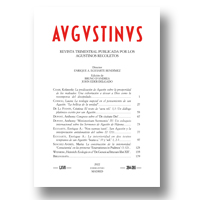|
21.
|
Augustinus:
Volume >
64 >
Issue: 252/253
Naoki Kamimura
La relación de identidad de los cristianos del norte de África con la ejercitación espiritual, en las cartas de Agustín
abstract |
view |
rights & permissions
| cited by
In contributing to the debate on the transformation of late Roman world, some scholars have claimed that the boundaries between religious groups were fluid with external and internal factors. Christian identity was not characterised by clear indications of religious belief, observance, and practice. Some intriguing surveys have shown that the difference between Christians and pagans can be seen as part of a discursive binary. While the North African evidence of their identity allows us to consider the question of what it means to be a Christian, it is noteworthy that there is a comprehensive framework for the understanding of human behavior and thought: the ‘spiritual exercises’ in the Greco-Roman tradition. In the fourth and fifth centuries, Christian thinkers began to pursue the matter in question as being linked with the context of his concern for Christianness in late North Africa, the correlation still remains in question. In this article, therefore, first I examine how he referred to the Christian code of behavior in his letters. In particular, focusing my attention on epistolary correspondence of Augustine with two seemingly ‘pagans’, I show how he tried to impose the idea of ehe Christian norms of behavior on his correspondence –with Dioscorus (epp. 117 and 118) and with Volusianus (epp. 132, 135, and 137). Then I ask what Augustine understood by spiritual training. For the sake of clarity, I have divided the letters along he thematic line into three groups –the intellectual and therapeutic (ep. 26, 37, 56, 102, 162, 193, 202A, and 2*), the religious and eschatological (ep. 92, 130, 131, 137, and 157), and the exegetical aspect (ep. 28, 137, 149, 199, and 213). In each group I consider them chronologically as far as possible. Finally, I consider the principal feature of spiritual training, thereby coming to the enhancement of spiritual affinities, and mutual relationships of which he made use in speaking about Christian identity.
|
|
|
22.
|
Augustinus:
Volume >
64 >
Issue: 252/253
Teppei Kato
¿Griego o hebreo? Agustín y Jerónimo sobre la traducción bíblica
abstract |
view |
rights & permissions
| cited by
This article elucidates the main topic in the discussion between Augustine and Jerome about biblical translation, by focusing on their views about the language of the source text of translation. According to the historical study of translation, translators at the time of Cicero were allowed to show their creativity, since they presupposed the reader’s ability to compare the Greek text with the Latin translation. Cicero, accordingly, chose free translation as his own principle. Augustine expected the readers of the Bible to compare the source text with the translation, claiming that the source text should be the Greek Bible, namely, the LXX. However, Augustine preferred literal translation, for he estimated the reader’s comprehension of the source text to be low. Jerome, on the other hand, anticipated the readers at a high level, so that he basically adopted free translation as a translation method of any kind of literary work, including the Bible. Moreover, since Jerome accepted the Hebrew text as the original text, rejecting the authority of the LXX, he recommended the non-Hebrew readers ask the Hebrews to examine the accuracy of his translation. In addition, as Augustine and Jerome have different attitudes towards translation, they also have different views on the ideological state of the LXX: Augustine allowed the LXX to be a free translation, while Jerome strictly demanded it to be a literal translation, even though their own translation theories are opposite, respectively.
|
|
|
23.
|
Augustinus:
Volume >
64 >
Issue: 252/253
John Peter Kenney
Nondum me esse: La Ontología temprana de Agustín
abstract |
view |
rights & permissions
| cited by
While ontological discourse is unfashionable in contemporary theology, it was prominent in the works of Augustine of Hippo. This article will concentrate on Augustine’s attribution of «esse» and related terms to God in his early works. Contrasting readings of Augustine’s ontological discourse will be reviewed, especially those of Émile Zum Brunn and Jean-Luc Marion. Texts under consideration will be drawn from Cassiciacum dialogues, the anti-Manichaean treatises, and Confessions. The article will conclude by clarifying the larger implications of Augustine’s commitment to ontological theology in the context of his account of contemplation.
|
|
